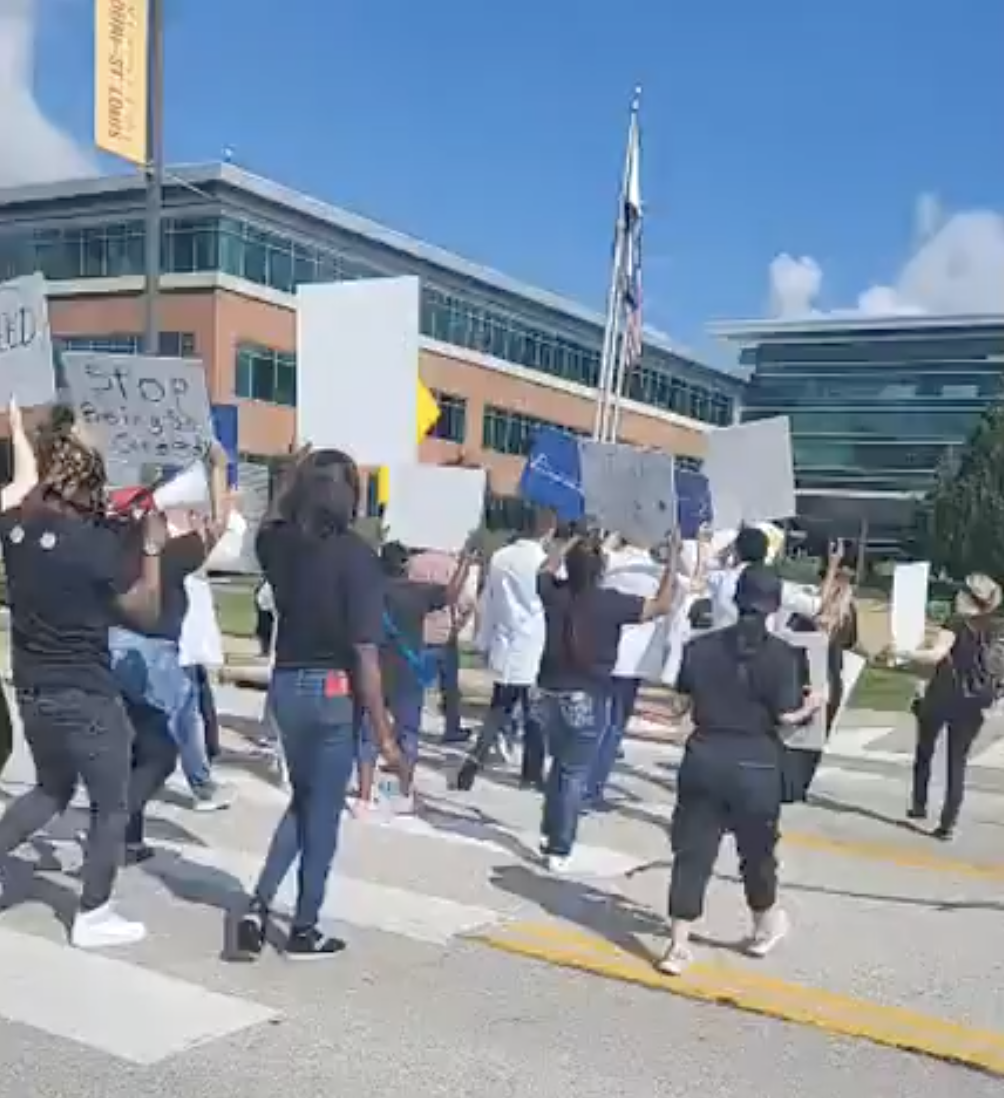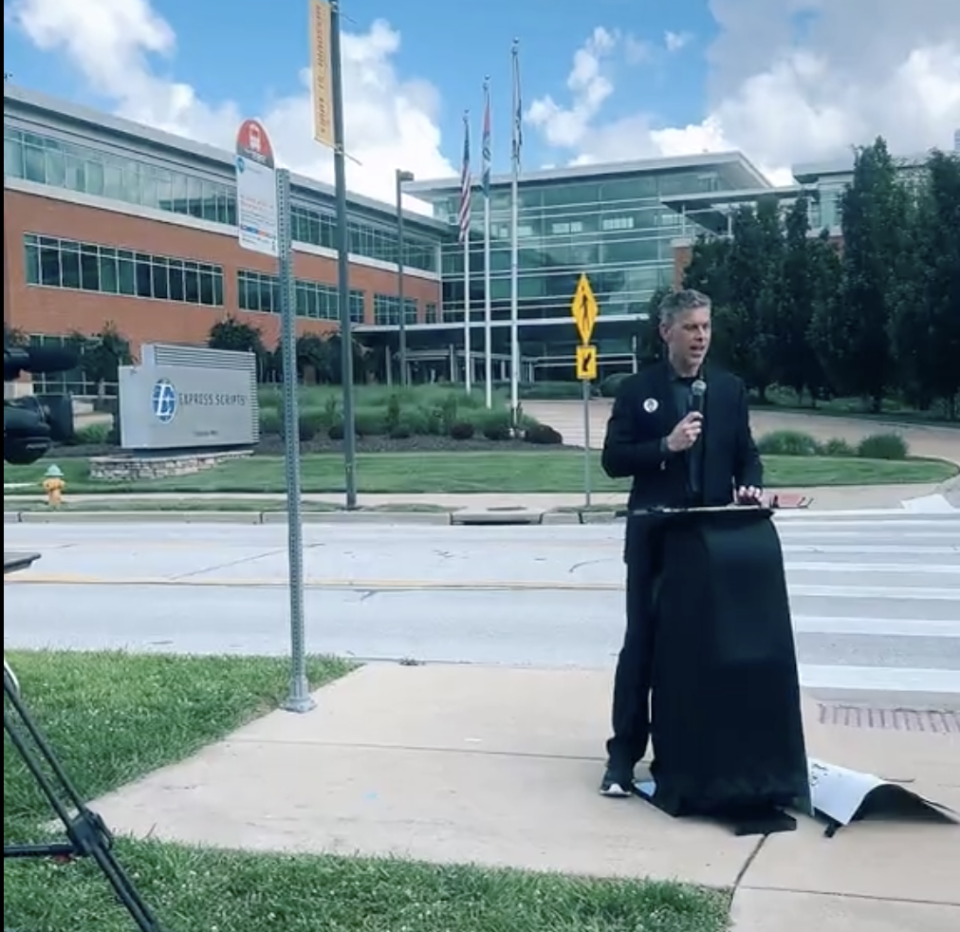High drug prices and pharmacy deserts: Protesters blame drug middlemen, demand regulation

Discouraged by a lack of action from Congress, leaders from America’s largest pharmacy associations marched with dozens of demonstrators Friday outside the St. Louis-based headquarters of Express Scripts, a major prescription drug middleman whose practices the group accuses of harming everyday Americans.
Protestors waved signs, shouted slogans and gave speeches at a makeshift podium across the street from the glass-and-brick building of the nation's second largest pharmacy benefits manager, or PBM.
As third-party administrators of health insurers’ prescription drug programs, PBMs negotiate drug prices with pharmaceutical companies, determine which drugs will be covered by insurance plans and set reimbursement rates for the pharmacies that buy and sell the drugs.
As the power of PBMs rose over the years, they demanded bigger rebates from drug manufacturers and pocketed increasingly bigger shares of those savings. They also lowered pharmacy reimbursement rates and tacked on hefty fees, prompting the closure of hundreds of independent pharmacies nationwide.
The three largest PBMs – ExpressScripts, owned by Cigna; CVS Caremark, owned by CVS Health; and OptumRx, owned by the same company as UnitedHealthcare – control a majority of the market.
Congress tried but failed earlier this year to pass reforms intended to level the playing field. The Federal Trade Commission also has launched an inquiry into PBM practices, which is ongoing.
"We need Congress to finish its job and pass payment reform legislation, and we need the clients of PBMs to be aware that when they hire companies like Express Scripts, they are killing small businesses and hurting the most vulnerable people," said B. Douglas Hoey, chief executive officer of the National Community Pharmacists Association, which represents independent pharmacists.
Hoey said Express Scripts reimburses independent pharmacists at a loss on eight out of every 10 prescriptions they dispense. As a result, he said, more than 500 independent pharmacies have closed in the past year alone.
The need for reform, protesters said, extends beyond the professional groups. Patients are being harmed by PBM practices that prevent them from using their preferred pharmacies or require them to first try less expensive drugs before approving the ones their physicians want to prescribe – even if those less expensive drugs are inappropriate.
"These are risky practices, and we don't like to be forced to take those risks," said Loretta Boesing, founder of the patient advocacy group, Unite for Safe Medications, and organizer of the Express Scripts protest.
USA TODAY reached out to Express Scripts and the Pharmaceutical Care Management Association, which represents PBMs, but did not get a response from either.
An average of one pharmacy closes every day in United States, said Ilisa Bernstein, senior vice president of the American Pharmacists Association, the industry’s largest professional organization.
"We represent pharmacists in all practice settings, and we get calls every day from people crying about the abysmal practices, the contracting, the underwater payments and all the different antics happening today," Bernstein said. "This has to stop."
Bernstein and Hoey were among numerous pharmacists, physicians, patients and patient advocates at the protest. It is the latest in a series of attempts by members of these professional groups and their allies to gain attention to their collective cause.

Those efforts include letter-writing campaigns, media outreach and high-profile events like last month's Pharmacy Fly-In when hundreds of pharmacists converged on Capitol Hill to talk to lawmakers and push for PBM reform.
"We stand together, united, on these core issues," Boesing told USA TODAY ahead of the protest, which she called "historic."
Boesing's interest in PBM reform is personal. Her teenaged son, Wesley, needs a steady supply of medication to prevent his body from rejecting a transplanted liver he received after a near-fatal infection when he was a toddler. But the PBM for the family's employer-sponsored health insurance plan would not pay for those drugs unless they came through its mail-order pharmacy, Boesing said.
Mail-order pharmacies might lower the costs for the PBM, but they introduce risk for Wesley because they can't guarantee adequate temperature controls on the drugs, which need to stay cold, Boesing said. A previous mishap nearly cost him his life, she said.
The family dropped the employer's health insurance plan and purchased another plan on the marketplace that allows them to use a pharmacy of their choice, even though it costs them more money.
"I worry about the other patients that don’t know how to navigate this system," she said. "There are a lot of patients that wouldn't know where to start with that."
Boesing said she chose Express Scripts for the site of the protest because it's within driving distance of her home in Missouri. Based on the turnout and the success of the event, however, she said she wants to organize similar protests outside the headquarters of CVS Caremark in Rhode Island and OptumRX in California.
"We need action now," she said. "So we will keep doing this until we get it."
If you are a pharmacist, physician or patient/consumer who believe you have been harmed by the practices of a pharmacy benefits manager (PBM), reach out to USA TODAY senior investigative reporter Emily Le Coz at elecoz@usatoday.com.
This article originally appeared on USA TODAY: PBM practices spark outrage and protests outside Express Scripts

